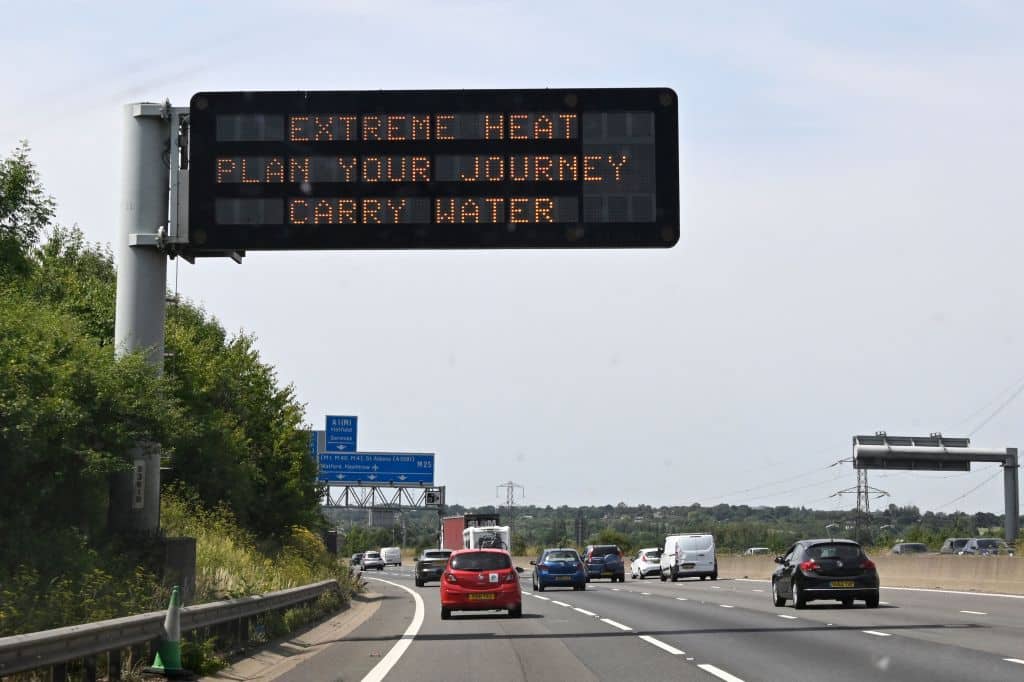UK Issues First-Ever ‘Red’ Heat Warning

 Why you can trust us
Why you can trust us
Founded in 2005 as an Ohio-based environmental newspaper, EcoWatch is a digital platform dedicated to publishing quality, science-based content on environmental issues, causes, and solutions.
As a heat wave continues to bake the European continent, the UK issued its first ever “Red warning for exceptional heat.”
Britain’s Met Office said this past Friday that it was issuing the alert because temperatures were forecast to hit and perhaps overtake 40 degrees Celsius Monday and Tuesday.
“We hoped we wouldn’t get to this situation but for the first time ever we are forecasting greater than 40°C in the UK,” Climate attribution scientist at the Met Office Dr. Nikos Christidis said in Friday’s Met Office announcement. “In a recent study we found that the likelihood of extremely hot days in the UK has been increasing and will continue to do so during the course of the century, with the most extreme temperatures expected to be observed in the southeast of England.”
Temperatures did not breach 40 degrees Celsius on Monday, according to BBC News. However, forecasters have warned that parts of the country could reach 41 degrees Celsius on Tuesday, The Washington Post reported, while regional records broke on Monday. Wales, for example, recorded its hottest temperature on record when Hawarden in Flintshire reached 37.1 degrees Celsius at 4 p.m., the Met Office tweeted.
The high temperatures have disrupted travel, with Network Rail closing stations on its East Coast Main Line between London King’s Cross and York and Leeds during afternoon rush hour through Tuesday, as Axios reported. This is because rail lines can expand and then warp in high heat. Luton Airport, meanwhile, had to pause flights Monday when the heat caused a runway problem.
As the UK is unaccustomed to extremely high temperatures, officials urged the population to take the situation seriously by drinking water, closing curtains and keeping tabs on friends and relatives, as BBC News reported.
“In this country we’re used to treating a hot spell as a chance to go and play in in the sun,” Met Office chief executive Professor Penny Endersby said, as BBC News reported. “This is not that sort of weather.”
While heat waves like this are a break with the past, they may also be a sign of what is to come in the future. Atmospheric scientist Dr. Simon Lee noted on Twitter that Tuesday’s forecast was remarkably similar to one projected for the UK by 2050 if the climate crisis persists.
“Climate change has already influenced the likelihood of temperature extremes in the UK,” Christidis said in the Met Office announcement. “The chances of seeing 40°C days in the UK could be as much as 10 times more likely in the current climate than under a natural climate unaffected by human influence. The likelihood of exceeding 40°C anywhere in the UK in a given year has also been rapidly increasing, and, even with current pledges on emissions reductions, such extremes could be taking place every 15 years in the climate of 2100.”
This means the country – famous for its cold, wet weather – will need to learn to adapt to warmer temperatures.
“It is time for the UK to stop thinking of itself only as a cold country, where any bout of summer sunshine is celebrated as an opportunity for beach visits and ice-creams,” Bob Ward, the policy and communications director at the London School of Economics Grantham Institute, told The Guardian. “Heatwaves are deadly extreme weather events that will grow worse for at least the next 30 years. We must adapt and do a better job of protecting ourselves, particularly those who are most vulnerable to hot weather.”
At the same time, it’s not too late to reduce greenhouse gas emissions to prevent future temperature extremes.
“Heatwaves will keep getting worse until greenhouse gas emissions are halted,” Grantham Institute senior lecturer in climate science Dr Friederike Otto told The Guardian. “The longer it takes the world to reach net zero emissions, the hotter and more dangerous heatwaves will get, and the more common and longer lasting they will be. The only way to stop heat records being broken time and again is to stop burning fossil fuels as quickly as possible.”
Subscribe to get exclusive updates in our daily newsletter!
By signing up, you agree to the Terms of Use and Privacy Policy & to receive electronic communications from EcoWatch Media Group, which may include marketing promotions, advertisements and sponsored content.

 233k
233k  41k
41k  Subscribe
Subscribe 




